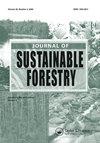基于社区的保护协会对森林生态系统服务和家庭收入的影响:来自肯尼亚Nzoia盆地的证据
IF 1.8
4区 农林科学
Q3 FORESTRY
引用次数: 1
摘要
增加热带地区森林生态系统服务的供应是大多数发展中国家森林政策的议程,尤其是在肯尼亚这个森林覆盖率低的国家。过去经验性影响评估的证据表明,这些评估存在许多局限性,例如当地森林群落内部的复杂性,以及在获取相关生态系统服务和家庭收入数据进行影响评估方面存在挑战。本文试图通过同时估算生态系统服务和家庭生计结果来解决其中的一些局限性。在肯尼亚十(10)个森林生态保护区内的两个(2)个的370个家庭中设计、预先测试和实施了一项调查方案,并提供了关于选定生态系统服务结果的次要数据。在Nzoia流域,参与保护协会所产生的处理效果的倾向得分匹配估计显示,参与保护协会的家庭在侵蚀控制(3.49)和生物多样性保护结果(0.071)方面具有显著的收入损失(- 57600.11)。论文最后建议在流域的再造林和造林项目中引入cbca家庭成员支付方案。本文章由计算机程序翻译,如有差异,请以英文原文为准。
Impact of Community Based Conservation Associations on Forest Ecosystem Services and Household Income: Evidence from Nzoia Basin in Kenya
ABSTRACT Increasing the supply of forest ecosystem services in the tropics is on the agenda of most developing countries’ forest policies and most importantly in Kenya which is a low forest cover country. Evidence from past empirical impact assessments show numerous limitations in these assessments such as complexities within local forest communities and challenges in accessing relevant ecosystem services and household income data for impact assessments. This paper attempts to address some of these limitations by estimating joint ecosystem services and household livelihood outcomes at the same time. A survey protocol was designed, pre-tested and implemented with 370 households in two (2) out of the ten (10) forest ecological conservancies in Kenya and with secondary data on selected ecosystem services outcomes. Propensity score matching estimates of the treatment effects of the treated from participation in conservation association show a significant income loss (−57600.11) for households participating in a conservation association with a positive effect on erosion control (3.49) and biodiversity conservation outcomes (0.071) in the Nzoia catchment area. The paper concludes recommending the introduction of a payment scheme with CBCAs household members in reforestation and afforestation programs in the Basin.
求助全文
通过发布文献求助,成功后即可免费获取论文全文。
去求助
来源期刊

Journal of Sustainable Forestry
Social Sciences-Geography, Planning and Development
CiteScore
3.90
自引率
12.50%
发文量
42
期刊介绍:
Journal of Sustainable Forestry publishes peer-reviewed, original research on forest science. While the emphasis is on sustainable use of forest products and services, the journal covers a wide range of topics from the underlying biology and ecology of forests to the social, economic and policy aspects of forestry. Short communications and review papers that provide a clear theoretical, conceptual or methodological contribution to the existing literature are also included in the journal.
Common topics covered in the Journal of Sustainable Forestry include:
• Ecology, management, recreation, restoration and silvicultural systems of all forest types, including urban forests
• All aspects of forest biology, including ecophysiology, entomology, pathology, genetics, tree breeding, and biotechnology
• Wood properties, forest biomass, bioenergy, and carbon sequestration
• Simulation modeling, inventory, quantitative methods, and remote sensing
• Environmental pollution, fire and climate change impacts, and adaptation and mitigation in forests
• Forest engineering, economics, human dimensions, natural resource policy, and planning
Journal of Sustainable Forestry provides an international forum for dialogue between research scientists, forest managers, economists and policy and decision makers who share the common vision of the sustainable use of natural resources.
 求助内容:
求助内容: 应助结果提醒方式:
应助结果提醒方式:


